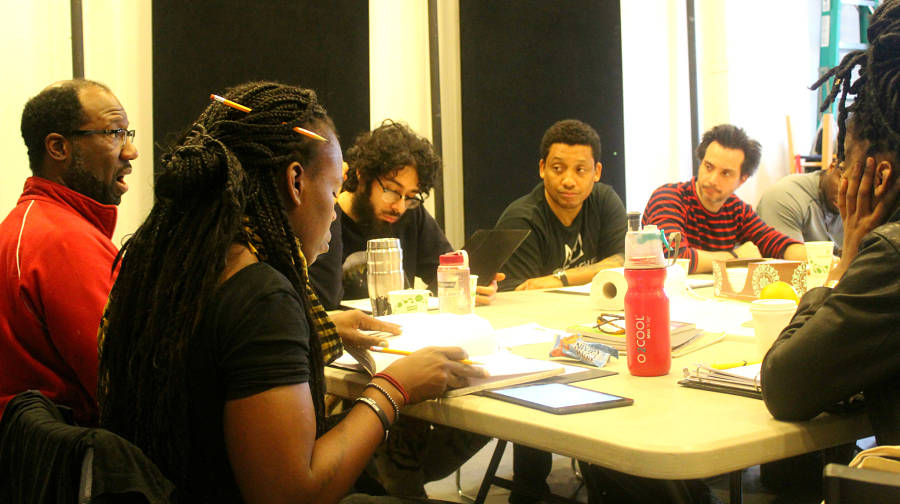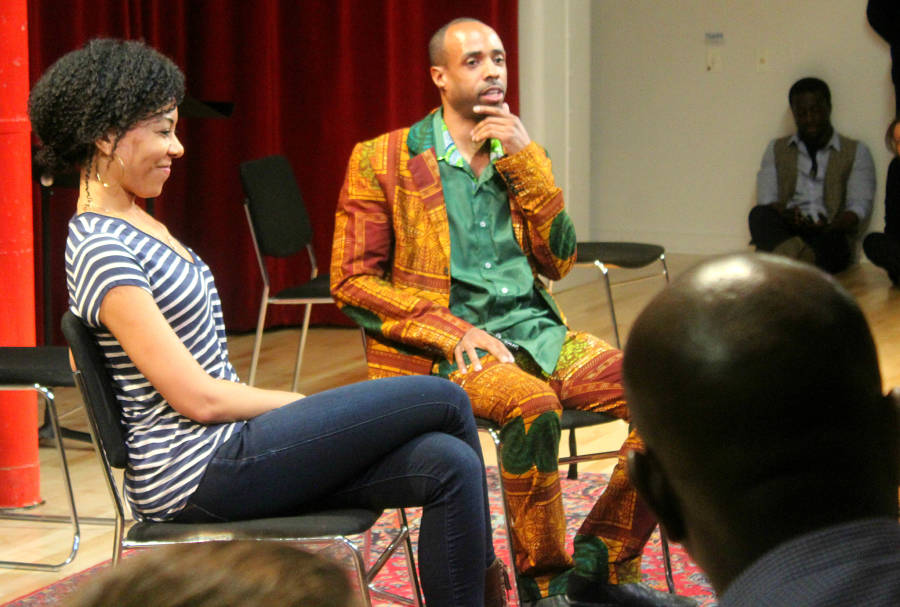On the last night of the New Black Fest, the house came down. The house had almost come down even before the reading started—so many people showed up, the festival had to establish an overflow area in the lobby. This somewhat informal arrangement meant that some of the audience were staring through the theatre’s open doors, laughing and shouting just a beat behind the rest of us. So—for the entirety of the reading of Ngozi Anyanwu’s Nike or We Don’t Need Another Hero, the audience was in syncopated time. There was therefore a kind of ripple effect to the night’s ecstatic reaction: When watchers jumped to their feet, mid-show, to applaud some bit of actor swagger (usually courtesy of Keith Randolph Smith), there were people way off by the restrooms doing the same thing, five seconds later.
Writing about live performance can been a fool’s errand—you say that there was “an electricity,” that the hairs on your neck stood up. They sound like clichés, they sound like metaphors, but occasionally they’re not. A current ran through the final night at New Black Fest, the sizzle of circuits connecting.
One of those circuits was artistic: Anyanwu had finished the play only that morning. All through the week-long festival, she’d been working frantically in the Writer’s Room, sending pages in to rehearsal where her actors waited. She’d tear off a batch; send them in; work on the next five pages. So the play was still hot to the touch, and the cast, directed by Russell G. Jones, included Smith (just finished with Jitney on Broadway), Okieriete Onaodowan (the original James Madison in Hamilton), Patrice Johnson Chevannes (Desdemona in the Patrick Stewart Othello), and Gregg Mozgala (the dancer/actor star of Enter the Faun).
Nike is Anyanwu’s myth-soaked epic about a woman discovering that she’s actually the Olympian goddess of victory. It was a tidy parallel that the festival had cast it with a theatrical pantheon; by curtain call, the room was convulsed in worship.
Another of those fizzing circuits, though, was harder to identify. The sheer level of energy was striking: New-play-reading festivals are not always such explosive affairs. They are usually respectful, supportive, warm. But things were different this year. The New Black Fest, with its focus on process, prides itself on nimbleness and the ability to respond quickly to current events. In April 2017, they had plenty of events to choose from. The theme—and title of the week’s opening panel—was Black Sustainability in the Trump Era. That…offers a clue.
This year’s fest, which ran April 3-7, was the third consecutive collaboration between NBF and the playwrights’ laboratory the Lark, which occupies two cozy floors in a Midtown Manhattan office building. After an opening panel on April 3, there were four pieces over four nights: James Anthony Tyler’s photorealistic workplace comedy Artney Jackson, Liza Jessie Peterson’s virtuosic aria-anthology Chiron’s Homegurl Healer Howls, NSangou Njikam’s pointed fantasy When We Left, and on the last night Nike. The plays have nothing at all apparently in common—which is intentional. Lloyd Suh, the Lark’s director of artistic programs, praises the NBF’s mission to promote “the diversity within the diversity.” The curatorial ambition is, as he says, to “challenge the expectation of what a ‘black play’ is.”

Keith Josef Adkins cofounded the New Black Festival in 2011 with fellow playwright J. Holtham and organizer/artist Jocelyn Prince. Prince is now the artistic coordinator at the Yale School of Drama; Holtham has joined peak TV. Adkins, though, stayed with the festival as artistic director, and in the seven intervening years, NBF has produced its annual week of new play readings as well as several swiftly assembled 10-minute play collections—like Hands Up, performed just three months after the shooting of Michael Brown.
When Adkins came out of graduate school in the late ’90s, conditions seemed sunny. He felt part of the “favored group,” he says—he was getting readings and commissions, the kind of heat that every emerging playwright hopes for. But as time went on, he noticed he was having trouble being seen as commercially viable. Readings weren’t turning into productions, and he was tired of having the same conversation about opportunity again and again. The Black Playwrights Convening at Arena Stage in 2010 galvanized him; he, Prince, and Holtham found each other there, and laid their plans for the New Black Fest.
This is the official story of how NBF came to be. But this year Adkins had longer timelines in mind.
“I was thinking about the things I negotiate every day,” Adkins says. “The aggressions I feel I can’t tolerate, the things I can’t take anymore—you know, little stuff like that. And then I started to think about my parents and grandparents. They endured things that were so much worse, and yet they were able to sustain a life.” Adkins now believes his impulse to organize actually comes from thinking of himself as “an extension of something.” That “something” is the legacy of opposition, survival and pain.
Adkins tells “an ongoing story in our family, one that was told from when I was just a little guy.” His grandmother—his father’s mother—had an older brother, who once refused to allow the police to search his house. This was in the early 1900s, in rural Georgia, and the police were white, and insistent. Still, Adkins says, “He said, ‘You’re trespassing; this is my property; I want you to go.’” The police left, but they came back later that evening—in robes. “They burst into my granduncle’s home and dragged him out and hung him from his tree,” says Adkins.
His grandmother was a child when she saw her brother lynched by the Klan. When Adkins speaks about organizing now, he doesn’t talk just about producing opportunities. Instead, he’s thinking generations forward, generations back. “I think,” he says, “About a man who resisted.”

The plays this year modeled various types of resistance, from representation (Peterson’s Chiron’s Homegurl is an exquisite, polyvocal portrait of black womanhood) to radical calls for liberation. Njikam’s When We Left, for instance, imagines a modern Back to Africa movement—the play, of course, calls it “Blaxit.” The piece was performed first in last year’s festival, but Adkins asked Njikam to bring the show back. “At least we ain’t gonna be doing the same passive shit we was doing before,” says one of the separatists.
That sounds familiar. Echoes playwright Njikam, “There are panels every year on diversity. There have been for decades, but the change hasn’t happened. I hope a theatre will refute my accusation and prove me wrong.” He doesn’t much believe one will, though. He’s been “developed” by theatres all over the map, but, he says, “They don’t really want to change. They don’t want to relinquish that power.”
Power, it turned out, was the week’s invisible theme: taking power, manifesting power, discovering power in the black self. And the week’s own charge came from the opening night panel. All panels are not created equal: Though I couldn’t attend it, everyone I spoke with during the fest was still on fire from the curated talk on—watch the whole evening below and you’ll see why.
NBF Associate Producer Lisa Rosetta Strum assembled a group that included Yvette Carnell, Tressie McMillan Cottom, Duarte Geraldino, R. L’Heureux Lewis-McCoy, and Dorian T. Warren. None of the speakers were particularly concerned with the theatre aspect of the fest, though Michelle Wilson (of Lynn Nottage’s Sweat on Broadway) moderated, the panelists themselves were public intellectuals active in policy or scholarship. Still, for all the artists who attended the talk, the conversation was a thunderclap that rolled on, long and audible, through the four days of theatre that followed. The night’s energy came from the invigorating nature of hearing unadulterated truth.
“The panelists came armed and armored with accuracy,” said Adkins, who was still quoting them verbatim days later. After so many months of punditry and inchoate fear, the data—names, dates, numbers—hit the audience with a palpable shock. For example: New York State owes billions to its underserved schools. For example: The median single black woman has five dollars in wealth.
Carnell—the activist/scholar behind the YouTube series Breaking Brown—rattled off facts about incarcerated black men. When Wilson asked her, “Is that failure or purpose?,” her response rocked the room. “Purpose,” Carnell said. “The gasoline that America runs on is black male failure.” It was difficult to hear, and Wilson grew visibly distraught. But there is power, as Cottom said, in “naming the devil.” Warren, an MSNBC contributor and activist, asked the audience something that seemed to echo with particular force. “The first Reconstruction took a war. So did the second,” he said referring to the Civil Rights Movement. “What does a Third Reconstruction look like?” The audience leaned forward. The room was singing with purpose. They wanted to know.
“And how hard are you willing to fight?”




